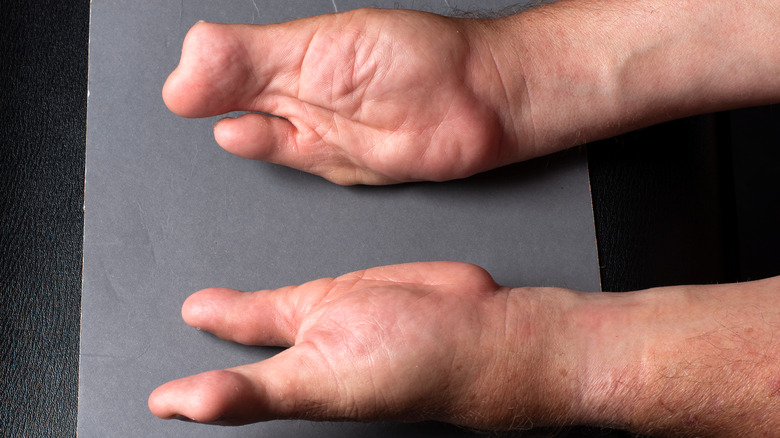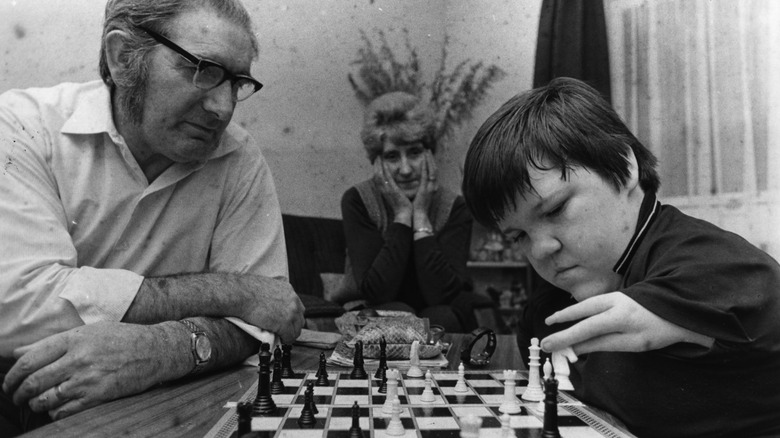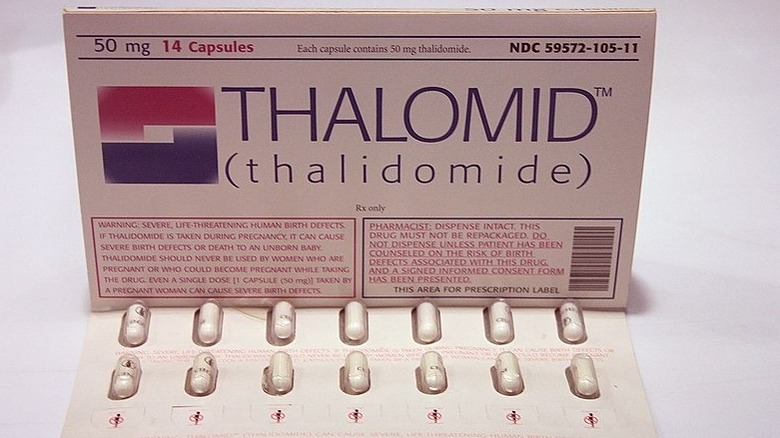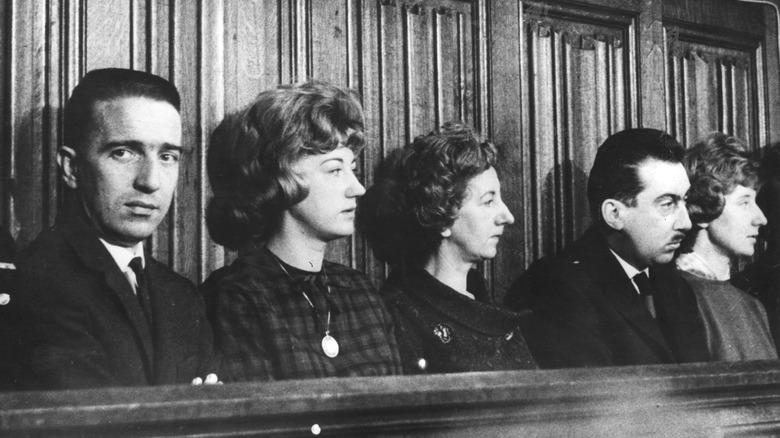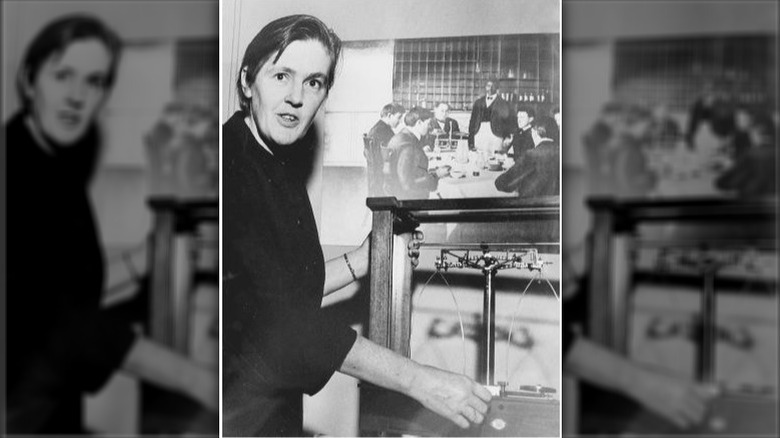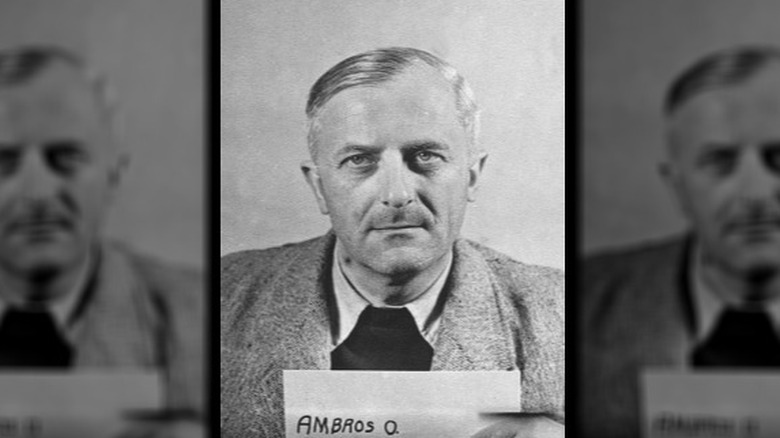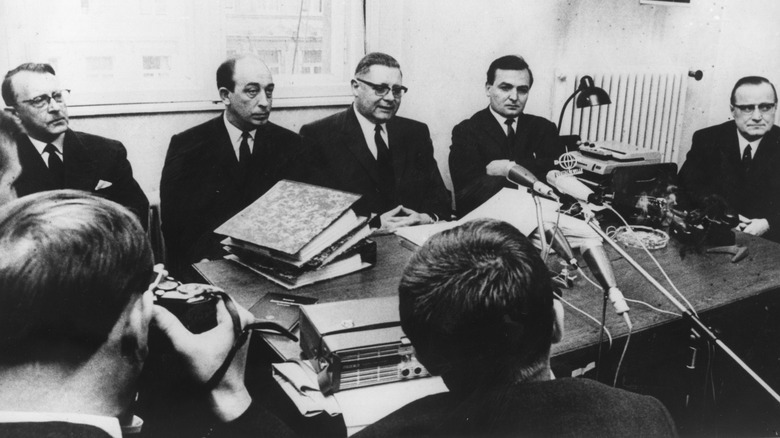The Disturbing History Behind The Thalidomide Scandal
Thalidomide, a drug originally created by the German company Chemie Grünenthal as a sedative, has become the world's greatest cautionary tale against the use of pharmaceuticals before they have been fully tested. The potent drug ended up causing thousands of babies around the world to be born without limbs. As the Thalidomide Trust states, many victims were born with only hands and feet where their arms and legs should have been; the eyes, ears and face, as well as other body systems, were also affected if mothers took thalidomide early in their pregnancies. As thalidomide victim Giselle Cole explains in a New York Times documentary, she has what is called "phocomelia," or foreshortened, flipper-like hands in place of her arms; this is a very common result of Thalidomide use.
The scenes that emerged after expectant mothers gave birth to these severely disabled children were so harrowing that the drug was banned in 1962, as per the journal Embryo Today, and the company eventually formally apologized to them, offering great sums of money in compensation. Thalidomide — and the company that created it — have become bywords for the corporate malfeasance and lack of research that led to their widespread suffering, as well as the death of many thousands of unborn children.
Thalidomide caused thousands of children to be born with defects
The first time birth defects were publicly associated with thalidomide was in a 1961 paper by Dr. William McBride, published in the British medical journal The Lancet, according to The Thalidomide Trust. However, babies with disabilities due to the drug had been born several years before someone went public. In fact, the first affected baby, the child of a Grünenthal employee, was born late 1956, after the drug was officially licensed in Germany for over-the-counter sales in July that year (via the United Kingdom's Science Museum).
As Newsweek reports, the drug company launched a huge marketing effort in 46 countries, with more than a million people in West Germany alone taking the sedative daily by 1960 (via the University of Chicago). Patients in the U.K. began to take Thalidomide in 1958, according to The Thalidomide Trust, with places like Australia also becoming large consumers, as per the New York Times states. It's generally estimated that some 10,000 babies were born with defects due to the drug, with the Thalomide Trust arguing that it could be as many as 100,000. Sadly, fewer than 3,000 are still alive today. As Deutsche Welle notes, nearly five out of every 10 children exposed to the drug died shortly after birth.
The drug was deemed so safe that it was sold over the counter
The German company Grünenthal, which brought Thalidomide to the market as a miraculous new sedative in the late '50s, declared that it was safe for pregnant women, even giving samples of the new wonder drug to its employees, as the New York Times reports. But it was clear something was wrong as early as December of 1956, when a Grünenthal employee's daughter was born with no ears after her mother had taken thalidomide. Despite this, the drug was marketed and sold as an over-the-counter medicine.
Eventually the drug became almost as ubiquitous as aspirin in some countries in Europe, according to the New York Times. A Canadian doctor recalled he and his medical colleagues around the globe were pressured to give it out. "We received it in quantities like a thousand pills, under tremendous pressure all over the world, to get this wonderful new drug on the market," physician Dr. Claude Murphy said. At one point, the Thalidomide Victims Association of Canada notes that thalidomide was sold under about 40 different names, in 70 countries worldwide, as per Deutsche Welle.
Americans unknowingly took thalidomide before it was banned in 1962
While thalidomide was not used as widely in the United States as in other countries, the New York Times states that as many as 20,000 American women may have taken it as part of clinical trials, with the two American drug companies sponsoring the trials not being fully transparent how experimental of a drug it was (and leaving out that it was being pulled from the German market, as per the New York Times). Incredibly, the drug samples weren't even labeled but given out in unmarked packets to patients who were suffering from headaches to anxiety to morning sickness.
One month after the American distributor of the drug, Richardson-Merrell, withdrew its application on March 8, 1962, the FDA announced that no American woman had yet given birth to a child with thalidomide-related birth defects, notes U.S. Thalidomide Survivors (USTS). However, the group says there are many thalidomide victims in the U.S. — and perhaps as many as 49, according to the Alliance for Human Research Protection. The USTS alleges evidence lay in FDA documents and the Library of Congress archives for decades.
The mothers of American thalidomide victims — unlike many of their counterparts elsewhere — usually had no idea what they were taking, and doctors were often instructed not to keep records of who they gave the drug. This places the burden on U.S. victims to prove that Thalidomide caused their birth defects.
The drug company forged the scientific paper saying the drug was safe
One of the scientific papers used as evidence in the approval process for thalidomide was forged by the drug company, Richardson-Merrell itself, the New York Times charged in its 2013 documentary on the subject. It was none other than Dr. Raymond Pogge, the company's medical director, as per "The Same and Not the Same," by Roald Hoffman. The research paper, titled "Trial of thalidomide in insomnia associated with the third trimester," was supposedly written by a physician called R.O. or "Ray" Nulsen, of Cincinnati, Ohio, and it was indeed published in the American Journal of Obstetrics and Gynecology in 1961.
Nulsen was one of the doctors in the American drugmaker Richardson-Merrell's subsequent trial, the Times states in a separate story on the scandal. The FDA's own investigation into the drug's distribution in the U.S. found that Nulsen had personally delivered no fewer than five babies who suffered from birth defects.
As Hoffman writes, Nulsen was depositioned prior to a criminal trial against Grünenthal, stating that he was aware that Pogge had written a report in his name, and that he had supplied him with the information "by telephone, or it may have been that we had lunch together, or it may have been when we played golf." In other words, no written record of the tests were exchanged.
Some infant thalidomide victims were abandoned – even killed – by their parents
TIME reported in a November 1962 story out of Belgium that one mother, Suzanne Coipel van de Put, along with her husband -– and even her own physician, Dr. Jacques Casters — were charged with killing the van de Puts' thalidomide-affected daughter, Corine. The girl, who was born with severe abnormalities — including having no arms and a malfunctioning gastrointestinal tract — had died from an overdose of barbiturates. At the trial, Dr. André Herpin, who signed the death certificate, testified, "If I had been the only one to know about the killing, I would have written 'death from natural causes.'" Herpin's comments were applauded by the 500 people in the courtroom; the van de Puts were subsequently acquitted of the child's killing.
Admittedly, few parents at the time were fully prepared to face a future with such severely disabled children. Giselle Cole, who represents the Thalidomide Victims Association, and who was born without arms, told the New York Times that many thalidomide victims were placed in institutions, while some families tried to have their children's fingers and toes amputated so that prosthetic limbs could be fitted. She added, "Many families were broken irrevocably."
An FDA new hire raised the red flag
Dr. Frances Kelsey, newly hired at the FDA, was given the task of approving thalidomide because it was viewed as a sure thing. Everyone expected smooth sailing for this new miracle drug. As U.S. Thalidomide Survivors details, the young physician, disturbed by the lack of safety studies, raised the red flag, causing the FDA to halt the approval process. Kelsey, who earned doctorates in medicine and pharmacology, was aware that substances could travel through the placenta into the unborn baby and requested thalidomide studies be undertaken on pregnant animals.
"Dr. Kelsey was absolutely a unique hero in American history," says Rock Brynner, the co-author of "Dark Remedy," in a New York Times documentary on the thalidomide scandal. It was Kelsey who refused to approve the drug until the proper studies had been finalized. This one-year delay resulted in the withdrawal and banning of the drug, since by that time birth defects were being linked to thalidomide in Europe and the U.K. She was later given the President's Award for Distinguished Federal Civilian Service by President John F. Kennedy for her heroic efforts to stop the drug's approval in the U.S., as per the JFK Library.
The German drugmaker Grünenthal had Nazi war criminals on staff
Chemie Grünenthal was founded in 1946 by Hermann Wirtz, a member of a family that had owned a cosmetics and soap manufacturing firm, as noted by the Financial Times. As The Guardian notes, he was also a member of the Nazi party, and the drug company quickly became the employer of a number of men with deep ties to the Nazi hierarchy.
Otto Ambros, the chairman of the drugmaker's advisory board, was one of the infamous German scientists who developed the nerve gas Sarin, used in gas chambers to exterminate Jews and others in concentration camps. He was convicted of war crimes — including mass murder — at Nuremberg and was sentenced to eight years in prison, serving four. Ambros was also responsible for the creation of the infamous IG Farben plant in Auschwitz, where residents were forced to work as laborers, making synthetic oil and rubber.
And he wasn't the only prominent Nazi who worked at Grünenthal. As Newsweek reports, Martin Staemmler, a former adviser to Adolf Hitler's dreaded SS, gave his input as to which individuals should be allowed to live and which should not and later served as the head of pathology at the drug firm. Incredibly, Dr. Heinrich Mückter, Grünenthal's head of medical research, was also an indicted war criminal, accused of experimenting on living prisoners at concentration camps, although he was somehow able to escape prosecution.
The thalidomide scandal forced the passage of drug approval regulations in the U.S.
President John F. Kennedy urgently addressed the nation in a press conference about thalidomide on August 1, 1962, stating, "every doctor, and every hospital, and every nurse has been notified. Every woman in this country ... must be aware that it is most important that they check their medicine cabinet, that they do not take this drug" (via the JFK Library).
The thalidomide scandal was responsible for Congress passing Kennedy's pharmaceutical regulations, the New York Times notes. He had long wanted to reform the drug approval process — the thalidomide horror was the tipping point that made this possible. "Largely, the same FDA guidelines that we live under today were created in the immediate wake," said Rock Brynner, co-author of "Dark Remedy."
Thalidomide has gone down in history as the reason why the FDA uses an extraordinarily exhaustive approval process for new drugs. Among the new amendments were requirements to prove a drug's effectiveness before hitting the market, that evidence-based research be conducted by qualified experts with informed consent of participants, that the FDA must give approval before could be marketed, and that the FDA also control drug advertising with side-effects clearly provided, as per the FDA.
The drugmaker Grünenthal originally claimed birth defects were from botched abortions
Astounding claims were made by the German drugmaker Grünenthal in an attempt to shift blame for the birth defects caused by thalidomide, even that they had been caused by botched abortions or the nuclear radiation circling the world after bomb tests, as the New York Times reports. The Guardian says the firm insisted that the first time it was aware of problems with the drug was in 1961 — although it had actually received a rash of complaints back in 1959. Its boilerplate response to the physicians making those claims was that it was the first time they ever heard of any problems.
The 1968 indictment against Grünenthal – including charges of involuntary manslaughter and intent to commit bodily harm — was an astounding 972 pages long, notes the Alliance for Human Research Protection. Outrageous machinations behind the trial in Germany, including Grünenthal's lawyer becoming the justice minister for the region and the company saying the birth defects were God's will, led to Grünenthal getting off on all charges, per The Guardian.
Eventually, however, the company settled with its victims in Germany, giving $31 million to them, notes the Alliance for Huma Research Protection. An Australian settlement meant thalidomide victims there received $100 million, per the New York Times. In Great Britain, thalidomide victims eventually received £6.5 million in compensation each year from Distiller, the British distributor of the drug, and its current owner, Diageo, The Guardian notes.
Thalidomide was made available again under strict regulation in 2004
Incredibly, the use of thalidomide continues even today — physicians may now prescribe it for a host of diseases, including multiple myeloma, as reported by The Guardian. The drug limits the growth of blood vessels — the very mechanism that caused birth defects in the unborn — but this ability can also be used to limit the growths associated with leprosy, as an Israeli physician discovered in 1964 when he gave it to leprosy patients to promote sleep (via the New York Times). In 1992, researcher Dr. Robert D'amato was the first to recognize the benefits of thalidomide for fighting cancer. He found its ability to limit blood vessel growth could also stop the growth of tumors.
In 2007, a study on multiple myeloma patients showed thalidomide extended their lives. The next year, the European Medicines Agency approved its use to treat this type of cancer. Many people now support prescribing thalidomide today, despite its tragic and shameful past. Giselle Cole of the Thalidomide Victims Association, who was born without arms, told the New York Times that she and other sufferers were concerned and very upset that the drug was to be used again; she acknowledged, however, that "this is not a perfect world. ... It's a fine line we walk. If it provides some kind of ... relief of suffering I cannot in good conscience be opposed."
New Thalidomide victims are still being born today
One of the most recent victims of what is believed to be thalidomide was a young Kenyan boy, Freddie Musean Mtile, The Guardian reports. The child, who was born without arms or legs, was transported to Great Britain in 2005 for treatment of his maladies, but he tragically died of a fungal infection shortly thereafter. Although it isn't known for certain if his mother had taken thalidomide, it is now prescribed throughout the developing world for leprosy, which is still endemic there, as well as AIDS.
According to the New York Times, in Brazil, where thalidomide is used routinely now to combat leprosy, as many as 100 children have been born with thalidomide's telltale birth defects since 2005, despite strict warnings not to take it if a woman could possibly be pregnant.
The German drugmaker Grünenthal apologized for Thalidomide 50 years later
In 2012, 55 years after the scourge of thalidomide was first unleashed, an official apology came from Dr. Harald Stock, the current director of Grünenthal. As reported by NPR, the company expressed its "sincere regrets about the consequences of thalidomide, and apologized for its years of silence. In addition, the company sponsored the creation of a touching sculpture by Bonifatius Stirnberg depicting a young thalidomide-affected girl with no arms, displayed in Stolberg, Germany.
However, the Associated Press (via CBS) reports that the belated apology was roundly condemned by some thalidomide survivors, with one, Freddie Astbury, of Liverpool, England, stating, "It's a disgrace that it's taken them 50 years to apologize. ... For years (Grunenthal) have insisted they never did anything wrong and refused to talk to us." To this day, the company has not given any monies to British victims. Astbury added, "It's time to put their money where their mouth is."
